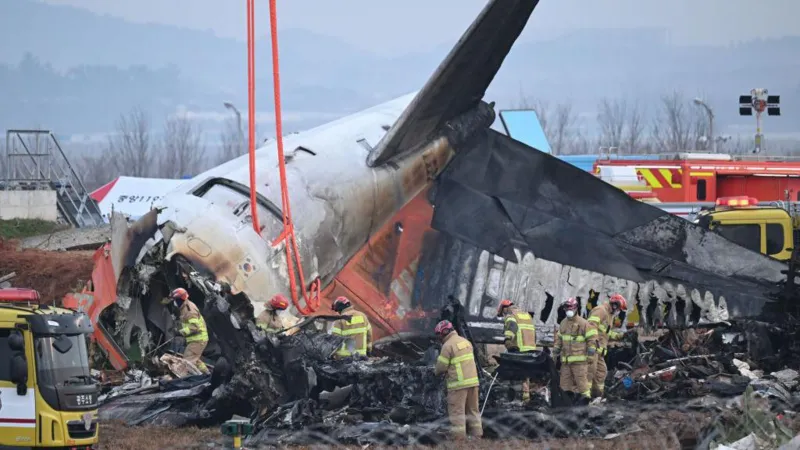Plane crash victims' families file complaint against Jeju Air CEO

Quick Read
Plane crash victims' families file complaint against Jeju Air CEO
Jeju Air Crash Families Demand Justice: Criminal Complaint Targets CEO, Officials
A Tragic Loss Sparks a Fight for Accountability
In a heart-wrenching push for answers, families of the victims of the catastrophic Jeju Air Flight 2216 crash have taken a bold step toward justice. On December 29, 2024, the Boeing 737-800 crash-landed at Muan International Airport in South Korea, erupting into flames after colliding with a concrete barrier. The disaster claimed 179 lives, leaving only two survivors and a nation in mourning. Now, the bereaved families have filed a criminal complaint against 15 individuals, including Jeju Air’s CEO Kim E-bae and South Korea’s Transport Minister Park Sang-woo, accusing them of professional negligence and violations of aviation safety laws. This move, reported on May 13, 2025, signals a desperate call for a swifter, more transparent investigation into one of South Korea’s deadliest aviation tragedies.
The Crash That Shook a Nation
A Routine Flight Turned Catastrophe
Jeju Air Flight 2216 was returning from Bangkok, Thailand, carrying 181 passengers and crew, including mostly South Korean nationals and two Thai citizens. As the plane approached Muan International Airport, the pilot reported a bird strike and issued a “Mayday” call, signaling distress. Moments later, the jet attempted an emergency belly landing without deploying its landing gear. The aircraft skidded off the runway, slammed into a concrete structure housing navigation equipment, and exploded into a fireball. The crash, South Korea’s worst aviation disaster since 1997, left families devastated and raised urgent questions about safety protocols, airport infrastructure, and airline oversight.
Early Findings Point to Multiple Failures
Investigations are ongoing, but preliminary reports have uncovered troubling details. Bird feathers and duck DNA were found in both engines, suggesting a bird strike may have played a role. However, experts argue that a single bird strike shouldn’t have led to such a catastrophic failure. Questions have also arisen about the concrete barrier, which housed a localizer antenna for guiding landings. Unlike frangible structures designed to break on impact, this solid barrier may have exacerbated the disaster. Families and analysts are now asking: Why wasn’t the runway safety area built to international standards? Did air traffic control respond adequately? And was Jeju Air’s maintenance and safety oversight up to par?
The Families’ Fight for Justice
A Symbolic Yet Powerful Complaint
On May 13, 2025, families representing 72 of the victims filed a criminal complaint against 15 key figures, including:
Jeju Air CEO Kim E-bae, already under a travel ban as police investigate his role.
Transport Minister Park Sang-woo, accused of failing to enforce aviation safety regulations.
Airline safety and maintenance officials, alleged to have neglected critical protocols.
Muan Airport authorities, criticized for inadequate bird strike prevention and runway safety measures.
The complaint, supported by a lawyers’ group, charges these individuals with professional negligence and, in some cases, homicide under South Korea’s Serious Accidents Punishment Act. While police have been investigating since the crash, the families’ action is largely symbolic, aimed at pressuring authorities for a faster, more thorough probe. Lawyer Lee So-Ah emphasized that the complaint ensures police must formally update families on the investigation, rather than providing voluntary briefings.
A Call for Systemic Change
Beyond seeking accountability, the families hope to spark broader aviation safety reforms. The crash exposed gaps in South Korea’s airport infrastructure, particularly at smaller facilities like Muan, which lacks advanced bird detection systems like thermal imaging cameras. The government has since pledged to install such cameras at all 15 domestic airports and develop bird-repellent drones by 2028. However, families argue these measures come too late for their loved ones. They’re also questioning why Jeju Air, a budget carrier, was allowed to operate with potentially outdated safety protocols and whether cost-cutting measures compromised passenger safety.
The Road Ahead: Challenges and Hope
A Lengthy Investigation Looms
The complexity of the crash means answers won’t come quickly. Investigators are still analyzing the plane’s black boxes, which mysteriously stopped recording before the crash, and piecing together the pilots’ final communications, which included three different landing plans. The involvement of U.S. experts from the National Transportation Safety Board underscores the international stakes, given the Boeing 737-800’s global use. Yet, no one has been indicted, and the families fear delays could dilute accountability.
A Nation Watches, Grieves, and Demands Better
The Jeju Air tragedy has galvanized South Korea, with public sentiment echoing the families’ demands for justice. Social media posts on platforms like X reflect outrage over perceived negligence, with users like @NewsHanguk and @HypeAviation amplifying the families’ cause. The crash has also reignited debates about budget airlines’ safety standards and the government’s role in regulating them. For now, the families’ complaint serves as a rallying cry, ensuring the 179 lives lost are not forgotten.
Conclusion: A Legacy of Change?
The Jeju Air Flight 2216 crash is a stark reminder of aviation’s high stakes and the human cost of systemic failures. As the families fight for justice, their courage shines a light on the need for accountability, transparency, and reform. While the criminal complaint may not immediately bring closure, it pressures authorities to act decisively. At Noyzy News, we’ll continue tracking this story, honoring the victims by amplifying the call for a safer future in the skies.
Sources: South China Morning Post, Times of India, Reuters, BBC, The New York Times, Anadolu Ajansı, CBS News, Al Jazeera, and posts on X.






